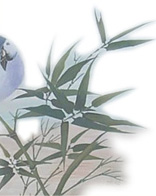|
 Listen to Shirley Singing the Poem in Chinese & English March 24,2012 Listen to Shirley Singing the Poem in Chinese & English March 24,2012
 Listen to Shirley Singing the Poem in Chinese July 14, 2007 Listen to Shirley Singing the Poem in Chinese July 14, 2007
 Listen to Shirley Explaining the Poem & Follow Me to Read It Listen to Shirley Explaining the Poem & Follow Me to Read It
 Follow Shirley to Read the New Words & the Poem in Chinese Follow Shirley to Read the New Words & the Poem in Chinese
 Learn the Meaning of the Poem & It Created Background Learn the Meaning of the Poem & It Created Background
 See Shirley Created Paintings for the Poem March 15-16, 2012 See Shirley Created Paintings for the Poem March 15-16, 2012
 About the Poet : About the Poet :
Li Bai (701-762) is one of the most renowned and admired poets in China , He was born in Chengji --it is near today's Gansu province (the other version said it is today’s Tianshui in Gansu ). When he was 5 years old, he was taken to Sichuan by his father.
Li Bai was influenced by both Confucianism and Taoism. He started to travel in the country when he was 25 years old. Then he entered the imperial court and became a member of the Han-lin Academy at the age of 42. He was greatly delighted and eager to serve the emperor like a capable statesman. But the Emperor Xuanzong only had him as a wonderful palace poet to write trivial lyrics. He was unwilling to serve such a meaningless function, so he left from the capital in less than two years, to start his second travel aimlessly wandering all over the country. Then he was charged with an adherent of the rebel and sentenced to exile, though he was pardoned on the way. He died of illness at Dangtu in today's Anhui .
Li Bai lived in the most flourishing times in the Tang Dynasty (618 - 907). Most of his poems reflected a positive times spirit. He is considered as the foremost romantic poet in the Tang Dynasty and his writing style has been affecting the following poets until now.
About 1,100 poems by Li Bai have come down from his times. They are very popular and be recited by Chinese from their childhoods.
About the Background of the Poem:
There was a period of time, Li Bai stayed in Bi Mountain idled, someone wondered why he lived in the mountain, and he wrote this poem as an answer. Another title of the poem is “ Shan Zhong Da Su Ren - Answer the Layfolks in the mountain” .
Bi Mountain is in today’s Anlu county, Hubei Province . According to the record of Anlu county annals, another name of Baizhao Mountain is just Bi Mountain. There is a peach blossoms rock, it is said that it was just the place that Li Bai read his books on it.
Comments about The Poem:
This is a seven-character quatrain (each containing of seven characters, with a strict tonal pattern and rhyme scheme) with a light and faraway poetic flavor, it expressed his leisure and peaceful heart, cared little for fame and gain, beyond secular society, and his fondness for the nature.
The first line: Wèn yú hé yì qī Bì Shān -- People ask me why I dwell in the Green Mountain.
Since the other title of the poem is Answer the layfolk( common people) in the Mountain, then, the people asked the question should be someone common ; yú, means I, me; qī means dwell, live and stay; Bì means Green, Shān means mountain. Bi Mountain is not only the name of the mountain, but also it writes out the sight of the mountain is green and hints the environment is peaceful and beautiful.
To ask a question in the first line, it is for pointing out the subject of the poem and for capturing the attention of the readers.
Anyway, when people want to listen to the answer, the poet did not answer us intentionally, then, please see the seond line: Xiào ér dù dá xīn zì xián ? I do not answer you, but smile with an easy/ peaceful / leisure heart”
“xiào ” means smile, laugh; “ ér ” means but, “ bù dá” means do not answer; “ xīn zì xián” means heart is at leisure. The word “ Xiào ? smile ” expresses how the poet is delight but reserved situation; “ xiào ér dù dá ? do not answer except smiling ”, with some mysterious color, makes a suspense.
The words“ xīn zì xián -- my heart is easy and leisure ” not only reflect the heart when the poet in the mountain, but also it points out that the question in the first line is not something new, but something I know already, anyway, I just do not want to tell you at all, because something wonderful is difficult to speak out directly. That is all.
Therefore, I feel the first line is sudden because of the question; the second line is blurred because of the interesting answer style. Do you want to know the answer? Smile, but do not answer, just let you guess it, to keep the readers in the suspense, meanwhile adds the poem with changing, flection and absorbing. The emotion and the life attitude of the poet is expressed via the word “Xian ? peaceful, leisure and easy .”
The last two lines: Táohuā líushuǐ yǎorán qù, bié yǒu tiāndì fēi rénjiān - Peach blossoms and the water flow far way, there is another wonderland, out of the world of human being.
These two lines write the landscape of the Green Mountain , it is in fact answering the question with a skillfully style, tell people why he lives in the mountain and hints us the good emotion of the poet at that time.
As I have told you that Li Bai read on a big rock by the stream when he lived in Bi Mountain
Then, Let us imagine, in a spring day, while we are facing a little streamlet that flows with sounds in the forest, the peach blossoms accompany the green mountains, together, the dropped flowers and the water are flowing far away, isn't it the “ Shi Wai Tao Yuan ? Arcadia ” by Mr. Tao Yuanming (365 ? 427) who lived in the Eastern Jin Dynasty (317-420) and the Southern Dynasties (420-589).
These two lines express the combination of the peaceful environment and the easy heart of the poet. When I wrote here, I could not help thinking, in fact, anything in this poem happens in the world of human being, then, why the poet said it is out of the human world? Because, this kind of artistic conception has forgotten both of the person and the matter, it will not be able to meet by any landscape in the world of human being.
This kind of writing style that does not have an answer, but also there is an answer, seems like broken, in fact its construction is connected.
The two lines write the landscape in the later spring, but, there is no any sadness and sorrow in it. Why?
 The last line: bié yǒu tiāndì fēi rénjiān - there is another wonderland, out of the world of human. It states his feelings frankly. In the peaceful nature, there is another distinctive wonderland, it is out of the world of the human being and it is much better than the hustle and bustle in the human society. Here is just the best end-result, it is his ideal Spiritual Home. To answer with non-answer. The last line: bié yǒu tiāndì fēi rénjiān - there is another wonderland, out of the world of human. It states his feelings frankly. In the peaceful nature, there is another distinctive wonderland, it is out of the world of the human being and it is much better than the hustle and bustle in the human society. Here is just the best end-result, it is his ideal Spiritual Home. To answer with non-answer.
Here he used the word “ xián ? easy, leisure and relaxed ”to hint how beautiful the Green Mountain is , to compare with the “ rénjiān ? human world ” cleverly.
It is really a wonderful writing style to contain something serious in the humorous style and something sad and pitied in the optimism and romanticism.
Now we have seen, there are only 4 lines in the little poem, but there are many things in it: question, answer, statement, depiction and remark, much content is contained in a short space with the natural and simple language, leisurely and easy tone, deep connotation and light and faraway artistic conception.
If we think of the fate of Li Bai, we can understand why he would like to stay in the Green Mountain, “ An Neng Cui Mei Zhe Yao Shi Quangui, Shi We Bu De Kai Xin Yan -- how can I bow down to the nobility so that makes myself in the unhappiness? ”( the last line of Meng Yu Tian Mu Yin Liu Bie by Li Bai)
Since his dream could not be true in the reality, since he loved freedom, he was innocent and romantic, then the best method for him to detach himself from the heavy and cruel reality is to go into the natural mountains and water, only he was there, his talent and passion could be really developed and released, his soul could get the peaceful forever.
The famous politician, calligrapher and poet Li Dongyuan (1447―1556) in Ming Dynasty (1368年-1644) said: “ The value of a poem depends on its meaning. The value of the meaning depends on its far away instead of its near, its lightness instead of its thickness; Something thick and near can be seen clearly; something light and far away is difficult to know. For example … Li Tai Bai’s Táohuā líushuǐ yǎorán qù, bié yǒu tiāndì fēi rénjiān ? peach blossoms in the water flow far away, there is another distinctive wonderland out of the human world … all something light but stronger, near but far away, it is difficult to say with the layfolks (common people). ”
For helping you to understand this poem, I created a piece of music for it, wrote a comment and sang it in Chinese it in Jan, 2007. Now I have painted a painting and re-witten the comment and re-resung it in Chinese and in English, I do hope that my effort will be some help with you to learn Chinese langauge and culture.
Note: This comment has not been checked by my English tutors who are native English speakers, but it has been checked up by my Chinese English tutor already. I will re-record the singing and the comment after all my English/American English teachers have checked up it latter.
The Main Meaning of the Poem :
People ask me why I dwell in the Green Mountain,
Respond with a smile, my heart is at leisure.
Peach blossoms in the water flow far away,
There is another wonderland out of the world of human.
Chinese Characters and Pronunciations
You can clink any Chinese Character to open the New Character Board and to see its Chinese pinyin, meaning, pronunciation and follow me to read it, also, you can hit the links over to enter the Painting Column,or you can directly enter the art notes on the painting that I created for this poem to see my painting and art notes for the poem
山中问答 - Shān Zhōng Wèn Dá
李白 (唐)- Lǐ Bái ( táng )
问余何意栖碧山 - Wèn yú hé yì qī Bì Shān,
笑而不答心自闲 - Xiào ér dù dá xīn zì xián。
桃花流水杳然去 - Táohuā líushuǐ yǎorán qù,
别有天地非人间 - bié yǒu tiāndì fēi rénjiān。
 If you have any questions, comments and suggestions, please write to shirley@ebridge.cn or shirleyz004@yahoo.com. You are welcome to publish your opinions in Message Board as well. If you have any questions, comments and suggestions, please write to shirley@ebridge.cn or shirleyz004@yahoo.com. You are welcome to publish your opinions in Message Board as well.
Shirley Zhang
March 18, 2012/Jan 14, 2007
|

